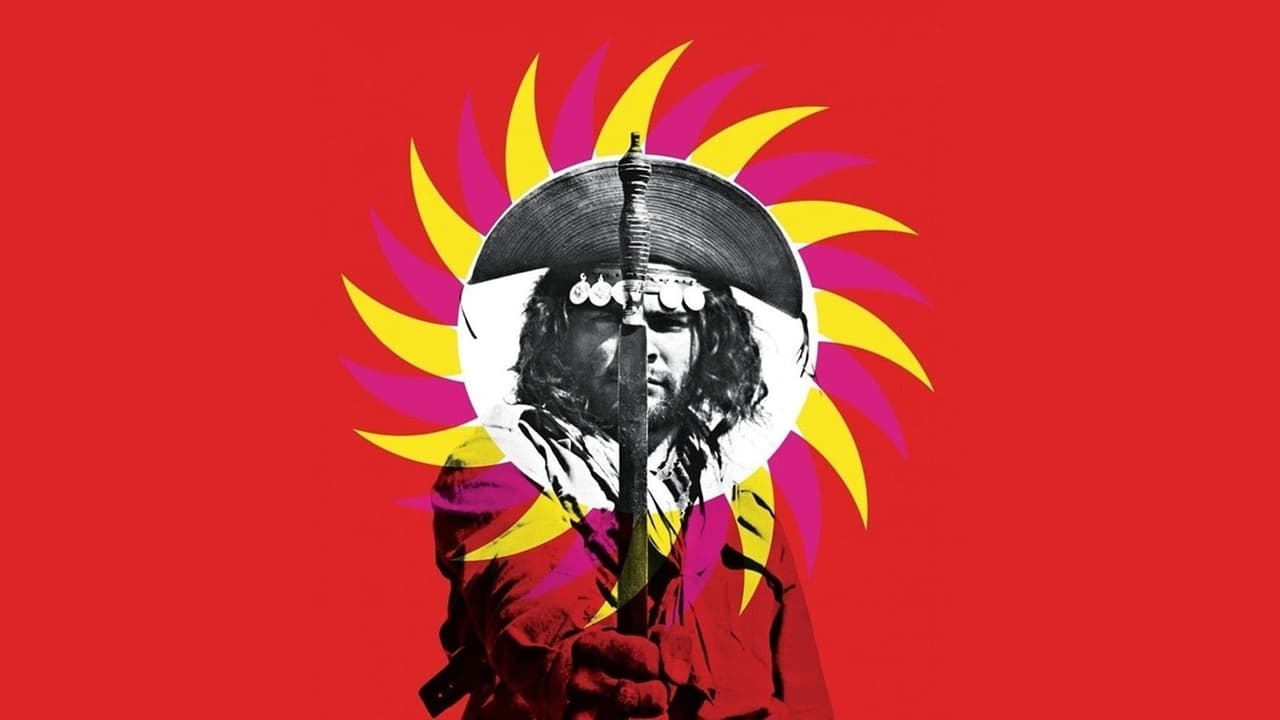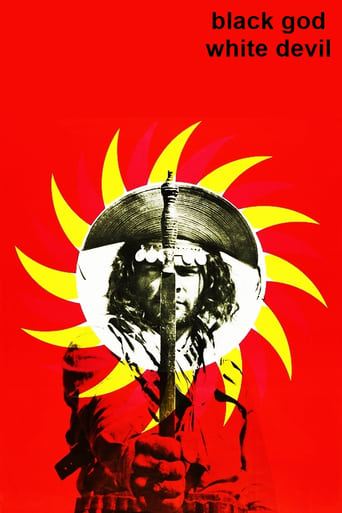



Terrible acting, screenplay and direction.
just watch it!
I like movies that are aware of what they are selling... without [any] greater aspirations than to make people laugh and that's it.
View MoreThe first must-see film of the year.
I kept thinking about Black God, White Devil but I couldn't gathered the right thoughts on it at first. For me discovering this film makes clearer the way Brazilian Cinema has become one of the most prolific and true to its own context cinemas in the world. I really believe that once an art manages to emancipate from the chains of the mainstream culture begins an honest art-form that is difficult to evade. I must admit that I had to pause the film in order to get some of the terms used trying to get the most from it. I had issues with the ample of the religious themes, but being from México another country in Latin America that has its history re-written in clerical ink gives me the notion the manner in which catholicism has permeated the Latin American countries' culture, and how was set to control the mind and acts! of the oppressed.The very first shots are overwhelming, we're being forced to grasp the world of the common folk, the amount of work to produce food for a day. To truly know these people's town through their quests, to learn about their struggle with corruption, fake prophets and their search for purpose, or simply a different life. The narrative is quite beautiful put, like a modest parable presents the story of Manoel who after killing his dishonest boss leave his home with Rosa, in his search for peace and justice stumbles upon with two different forces, the first from the "realm of god", a leader who promises a land full of everything the sertão is lacking, but the cost to it includes acts of utter violence; the second one offering to fight the system but with no honor, both asking for blind obedience and servitude. In the middle is Rosa, the voice of reason that we rarely give the credit deserved. The arc of Manoel and Rosa ends just how it began with they leaving behind everything they know, everything we came to know, with nothing but uncertainty about their future. Perhaps that's the commentary Rocha is offering us, that in a putrid system it is no good to trust rigid and tyrannical figures, and sometimes that in which we attribute power is leaving us empty.For me the cinematography felt as a part of the narrative, the overexposed takes are fascinating, the contrast between black and whites makes you feel the rawness of that arid space the characters are into. Perhaps is not a film for everybody not because the author made the effort to distance its oeuvre for a 'type of moviegoers' conceivably it has more to do with how we're used to learn only about our own struggles without reaching beyond the familiar, if you choose to ignore the history of other countries and detach yourself from their struggle surely you'll find this film 'boring', I think is time to learn about each other and be sensible about it.
View MoreA film that rewards with repeated viewings, I appreciated the review by 'debblyst' which gives a close reading of a film & historical background that can test the patience on its first viewing. It's also clear how this film influenced film-makers like Leone.I loved the setting of the austere desert, almost biblical landscape, harsh, cruel and devoid of water (spirituality, humanity). The film doesn't possess a traditional narrative, but it is basically two lengthy sequences where the lead protagonist, Manuel, and his wife, Rosa, come under the influence of a false prophet and then a psychopathic revolutionary before heading into an uncertain future where a man must listen to his own voice. A film dominated by striking images such as the path up to Monte Santo, the massacre of the Monte Santo innocents & subversive images such as the shadow of Rosa's knife & das Mortes' gun crossing on the wall in an ironic reversal of the Communist symbol.The film is filled with many memorable characters such as the prophet Sebastian & his followers (Bergmanesque hysteria), the vengeful Corisco, the bounty-hunter, das Mortes, & Manoel & his wife Rosa - and the blind minstrel Julio. I also enjoyed the sung musical narration . The most memorable scene for me occurred early in the film: Manoel's vision of Sebastian and his followers. The rest of the film becomes a fable about disillusion, both spiritual & revolutionary. In the film, Manoel becomes entranced first by the mystic, revolutionary fervour of Sebastian, bordering on the hysteric, and then a willing accomplice in Corisco's crimes. Both Sebastian & Corisco manipulate Manuel into committing violent acts: the ritual murder of a child and the brutal emasculation of a young man. Disoriented by his experiences, Manuel can only exclaim: "Is the only way to get justice by shedding blood?"The film is about faith, fanaticism & extremes. In a world where the government & traditional Church suppress the poor, faith and revolutionaries offer hope, but, in turn, descend into extreme behaviour. Antonio das Mortes, the agent of conservative forces, also undertakes a journey of doubt, parallels Manuel.The story reminded me of Gabriel Garcia Marquez's 'One Hundred Years of Solitude' where the revolutionaries turn out to be as violent as the repressive government forces they fight against. 'Black God, White Devil' is probably best regarded as 'heightened cinema' akin to the 'magical realism' of Latin American literature.
View MoreNothing wrong with a movie that is being a bit slower and different, as long as it fascinates. And this movie does that well.It's an unusual movie, with an unusual approach and story. This is not a slick Hollywood movie here but an artistic South-American one. It doesn't really follow any familiar movie rules but having said that, this movie at the same time still remains a perfectly accessible one.Even though there are of course some deeper meanings behind it all, the movie never feels too serious or heavy handed. The movie actually still manages to entertain as well, which is for most part thanks to its very lively characters, who especially come to live in its second half. Most people seem to have most problems with the movie its second half but I actually do think that this was the strongest and most intriguing part of the entire movie, since it seemed to focus more purely on its characters and less on its story, that is a complicated one to follow and completely understand. What I foremost love about this movie is that it's being shot like a western, while it's actually a totally different genre movie, set in Brazil. The cinematography, directing, characters and such still make this movie really feel and look like a good old spaghetti western.Due to its directing approach and way of storytelling this is a very visual orientated movie. Even though it can be a slow movie at times, its visuals still manages to fully keep you interested throughout. It's black & white cinematography does ensure this well.No need and reason to overpraise this movie but it remains simply a good and special one to watch.7/10http://bobafett1138.blogspot.com/
View MoreThis movie is considered by the critics as the most important Brazilian movie of all times. And they are right in this point. An impressive, outstanding portrait of Brazilian rich culture with a focus on some delicate subjects as religion, faith, violence and economic exploration. Rocha made here a fantastic synthesis of the main problems of Brazil, problems that still remained almost forty years after. Great performances by Del Rey and Mauricio do Valle.
View More